|
|
 |

|
"China,
Kazakhstan and Russia" |
 |
 |
|
|
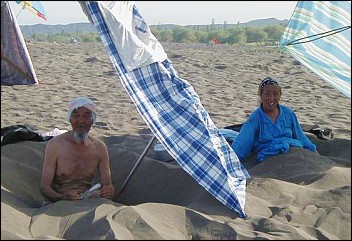 Friday,
20th of July. The path of the rigtheous biker is beset on
all sides by the inequities of the car and the tyranny of
traffic laws. We´re in Helsinki, Finland. Roads, traffic
signs and regulations a) are existing and b) are understandeable.
You may guess that the above was not always true in Russia
and Kazakhstan. But more of that later.
Friday,
20th of July. The path of the rigtheous biker is beset on
all sides by the inequities of the car and the tyranny of
traffic laws. We´re in Helsinki, Finland. Roads, traffic
signs and regulations a) are existing and b) are understandeable.
You may guess that the above was not always true in Russia
and Kazakhstan. But more of that later.
As planned,
we took a plane from Almaty, Kazakhstan to Urumchi, China,
heading on to two of the main sights of Xinjiang Province,
Kashgar and Turfan. After ten months as motorcycle travellers,
it felt quite strange to suddenly be back on the old-fashioned
tourist track, with all its advantages and disadvantages.
Kashgar was spectacular : Its sunday market had been described
in our guide as one of the most spectacular in Asia, and we
were not disappointed. A teeming mass of people from all over
Central Asia selling exotic fabrics (much to Ellen's delight),
yummy dumplings and piles of noodles and other funky foods,
viciously haggling knife sellers, strange hats, it was a great
day.
After
some sightseeing in Kashgar, we flew back to Urumchi, spent
the night and headed on to Turfan by bus. It was very, very
hot (45 C), the Turfan depression being the lowest spot in
China and the second lowest in the world. Nevertheless, around
three o clock in the afternoon the locals head for the "beach",
a sand dune just outside of town to bury themselves in sand
so hot it can cook an egg in 20 minutes. We were told this
practice was medicinal.
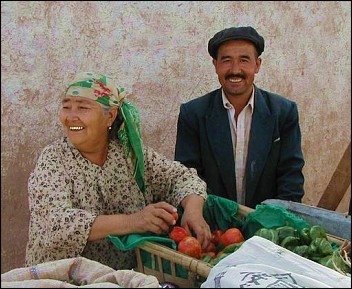 The
area is teeming with sights most of which we saw, rounding
off the days with cold drinks and alternating Chinese and
Uyghur food. Xinjiang Province has a population of about 50%
Uyghur, a Turkic people, and 50% Han Chinese, which makes
for a lot of diversity. However, the Uyghurs don't seem to
feel very attached to China, as our guides and acquaintances
would whisper to us. We were constantly reminded that we were
once more in a country where freedom of speech is at the very
least limited and a certain measure of caution is appropriate
when asking locals questions about their culture.
The
area is teeming with sights most of which we saw, rounding
off the days with cold drinks and alternating Chinese and
Uyghur food. Xinjiang Province has a population of about 50%
Uyghur, a Turkic people, and 50% Han Chinese, which makes
for a lot of diversity. However, the Uyghurs don't seem to
feel very attached to China, as our guides and acquaintances
would whisper to us. We were constantly reminded that we were
once more in a country where freedom of speech is at the very
least limited and a certain measure of caution is appropriate
when asking locals questions about their culture.
Back in
Almaty, we spent a few more days mostly lazing around Matt's
house, having some work done on the bikes and surfing the
net, before heading out again. We had been warned that the
roads in central Kazakhstan would be bad and the landscapes
flat and uninspiring. They were. There should be some improvements
soon however as half of the road network seemed to be under
construction, which seemed like a small consolation at the
time. Perfectly acceptable stretches of asphalt would be interrupted
by construction sites miles long, traffic having to pass along
miserably dusty and bumpy gravel roads, where oncoming trucks
would shower you with stones and dust. But worse was to come.
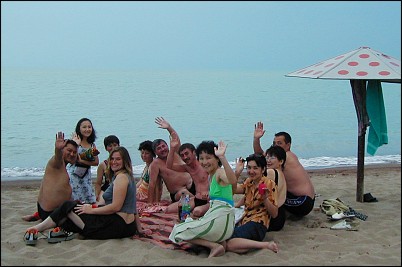 After
repeated assurances by different people that "nyet problem,
there's only about 4 km of good gravel", we took what
looked like a good option on the map, soon finding ourselves
on a muddy track through endless fields. Of course, it also
started raining, in confirmation of Murphy's law. The road
got increasingly worse, eventually forcing us to get off it
altogether and ride through the fields. At least there weren't
any landmines (see Mauritania chapter), and after a couple
of crashes, we finally got back on asphalt.
After
repeated assurances by different people that "nyet problem,
there's only about 4 km of good gravel", we took what
looked like a good option on the map, soon finding ourselves
on a muddy track through endless fields. Of course, it also
started raining, in confirmation of Murphy's law. The road
got increasingly worse, eventually forcing us to get off it
altogether and ride through the fields. At least there weren't
any landmines (see Mauritania chapter), and after a couple
of crashes, we finally got back on asphalt.
Accomodations
in Kazakhstan were another surprise : At Lake Balkash, we
stayed at a place that could best be described as a postapocalyptic
seaside town, although we didn't manage to find out what exactly
its function was. We don't remember the name either which
doesn't matter since it's not on the map anyway. The lake
is lined with similar places, mostly decrepit but quite busy
with Kazakh and Russian tourists seemingly spending most of
their day drinking impressive amounts of vodka. In one town,
Choubar Tyubek, while Ellen was busy negotiating a room, I
walked down to the beach and was immediately grabbed (literally!!)
by a very loud group who seemed to like my boots. They offered
me vodka, serenaded me on a balalaika, and seemed scandalized
at the thought that I would not immediately finish the bottle.
I had a hard time getting away from their rather aggressive
brand of hospitality.
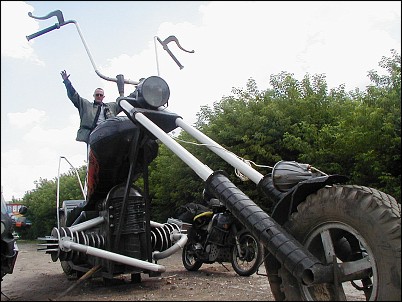 Luckily,
much more relaxing welcomes were offered shortly afterwards.
As I went to buy some supplies, I was invited for a drink
by a friendly Russian who proposed to meet us for dinner that
evening along with his family. We were unfortunately a bit
late for dinner because in the meantime we had yet again been
invited by a Kazakh policemen to celebrate with his family
and friends on the beach, eating smoked fish and drinking,
guess what? Dinner proceeded along the same general lines,
accounting for the fact that we left rather late the following
day. Great people.
Luckily,
much more relaxing welcomes were offered shortly afterwards.
As I went to buy some supplies, I was invited for a drink
by a friendly Russian who proposed to meet us for dinner that
evening along with his family. We were unfortunately a bit
late for dinner because in the meantime we had yet again been
invited by a Kazakh policemen to celebrate with his family
and friends on the beach, eating smoked fish and drinking,
guess what? Dinner proceeded along the same general lines,
accounting for the fact that we left rather late the following
day. Great people.
Shortly
before Karaganda, Ellen's motor died and would not be revived.
As it was getting late and we had no idea what the problem
was, we once again requisitioned a truck to get the bike the
last 30 km into town. As some of our tools had been stolen
shortly before and no mechanic was to be found, we called
Sergei, a casual acquaintance in Almaty, asking if he could
help. 20 minutes later, two Ladas driven by what looked suspiciously
like bodyguards shrieked to a halt, 5 people jumped out and
analyzed the situation. One of the tough guys and an interpreter
were delegated to stay with us until the problem was solved.
A shop was identified, the bike delivered to the attention
of about 10 people displaying varying degrees of productivity,
the problem was solved (turned out to be bad gas) and we were
on the road again the same day.
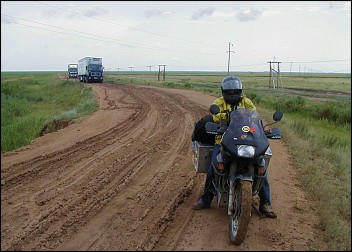 After
resting for a day in Kazakhstan's brand new capital, Astana,
we reached its most northern city, Petropavlosk. From there,
we crossed the border into Russia, passing through Kurgan
and Chelyabinsk, rode over the Ural mountains and headed on
through Ufa, Naberezniye Celny, Kazan, Niznij Novgorod and
Suzdal, before reaching Moscow. Before planning for this trip,
we had never heard of most of these cities, so it came as
a bit of a surprise to discover that most of them had well
over a million inhabitants. Unfortunately, that was about
the only interesting thing about the first four cities we
passed. Grey concrete, high pollution and a population visibly
suffering from Russia's current economic troubles more or
less sums up our impressions. One more impression does stand
out : The absolutely spectacular unpleasantness of some of
the hotel personnel we encountered. Even if it's a well known
fact that Soviet Russia did not exactly encourage customer
service, we were dumbfounded at the way some of these characters
seem to hate their customers. It's not limited to tourists
either, there's enough of it for everybody.
After
resting for a day in Kazakhstan's brand new capital, Astana,
we reached its most northern city, Petropavlosk. From there,
we crossed the border into Russia, passing through Kurgan
and Chelyabinsk, rode over the Ural mountains and headed on
through Ufa, Naberezniye Celny, Kazan, Niznij Novgorod and
Suzdal, before reaching Moscow. Before planning for this trip,
we had never heard of most of these cities, so it came as
a bit of a surprise to discover that most of them had well
over a million inhabitants. Unfortunately, that was about
the only interesting thing about the first four cities we
passed. Grey concrete, high pollution and a population visibly
suffering from Russia's current economic troubles more or
less sums up our impressions. One more impression does stand
out : The absolutely spectacular unpleasantness of some of
the hotel personnel we encountered. Even if it's a well known
fact that Soviet Russia did not exactly encourage customer
service, we were dumbfounded at the way some of these characters
seem to hate their customers. It's not limited to tourists
either, there's enough of it for everybody.
Among
other things, it was the various floorladies' way of knocking
(especially early in the morning) , a loud, vicious, impatient
hammering on the door that would send us up the walls. One
particularly unpleasant and completely drunk specimen managed
to wake us up three times between 6.00 and 7.00 a.m., asking
us when we were leaving, forgetting the answer, and coming
back to ask again. I was ready to do something drastic but
Ellen wouldn't let me.
Generally
speaking, Russians, as well as people in Central Asia seem
to have a very different notion of personal space than we
do and after almost two months spent in what used to be the
Soviet Union, it finally started getting to us.
As we
drove further west, the cities became more interesting. Especially
Kazan, the capital of the semi-autonomous region of Tatarstan,
as well as Suzdal have a rich history and the monuments to
prove it. We were back into sightseeing mode and spent some
time wandering around, admiring the sights. The roads became
increasingly choked with traffic, streetsigns were notably
absent, and speed limitations were not posted but heavily
enforced by speedtraps. We collected three speeding tickets
in as many days, doubling our total for the trip. Luckily,
the rates are reasonable for our standards, 100 roubly, about
three dollars. The policemen were quite a pleasant surprise,
since none tried to squeeze us for a bribe. Same thing at
checkpoints, we would usually get waved through.
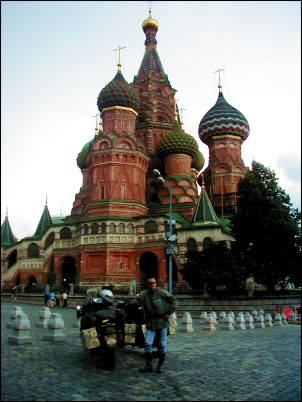 We
rode on to Moscow, where we had a contact received by friends
in Luxembourg. Sergei Krivogonov, a motocross racer, gave
us a quite unusual but fabulous tour of some sights, including
his training ground (where he did a few jumps on his bike,
fully dressed up in a business suit), a bikerclub's den with
a very large motorcycle, as well as the nightly gathering
place of Muscovite bikers. Moscow is a rather funky place,
totally unlike anything we had seen in Russia so far. It's
very expensive, with plenty of trendy restaurants and night
clubs filled with well dressed people dancing their hearts
out. We only stayed for a couple of days, visiting some of
the more traditional sights as well, before heading north
again, towards St. Petersburg which is certainly the most
touristy town in Russia, and justifiably so. While Moscow
is the political and economic heart of the country, Piter
(as we heard some Russians affectionately call it) is its
cultural centre. A fascinating history, spectacular architecture
and the famous St.Petersburg white nights (it was only dark
about four hours a day) combined to make it a place to come
back to. A careful estimate of the time needed to visit all
the places we would like to visit or revisit yields a total
of about four reincarnations, and that's not counting the
time we will spend as warthogs for sins committed in this
life. We'll see.
We
rode on to Moscow, where we had a contact received by friends
in Luxembourg. Sergei Krivogonov, a motocross racer, gave
us a quite unusual but fabulous tour of some sights, including
his training ground (where he did a few jumps on his bike,
fully dressed up in a business suit), a bikerclub's den with
a very large motorcycle, as well as the nightly gathering
place of Muscovite bikers. Moscow is a rather funky place,
totally unlike anything we had seen in Russia so far. It's
very expensive, with plenty of trendy restaurants and night
clubs filled with well dressed people dancing their hearts
out. We only stayed for a couple of days, visiting some of
the more traditional sights as well, before heading north
again, towards St. Petersburg which is certainly the most
touristy town in Russia, and justifiably so. While Moscow
is the political and economic heart of the country, Piter
(as we heard some Russians affectionately call it) is its
cultural centre. A fascinating history, spectacular architecture
and the famous St.Petersburg white nights (it was only dark
about four hours a day) combined to make it a place to come
back to. A careful estimate of the time needed to visit all
the places we would like to visit or revisit yields a total
of about four reincarnations, and that's not counting the
time we will spend as warthogs for sins committed in this
life. We'll see.